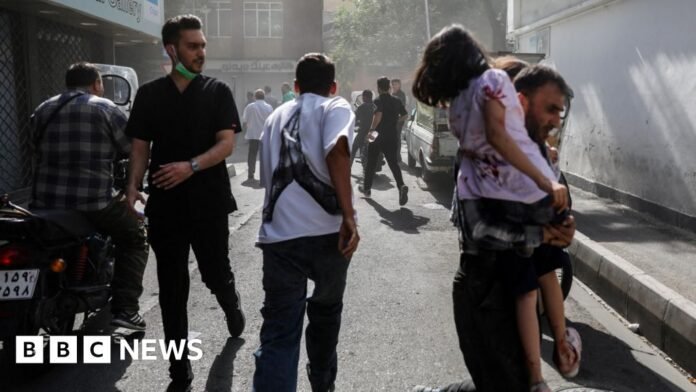“Stuck”. That is the word most people who have spoken to the BBC use to describe life in Iran right now.
After three days of Israeli attacks, “everyone is trying to escape” Tehran “one way or another,” one resident told BBC News Persian.
On Sunday, long queues formed at petrol stations across the city. Many people tried to leave for remote areas, away from any possible Israeli target, but could not even get out of the province because of heavy traffic.
“Tehran isn’t safe, clearly,” one resident said. “We get no alarms or warnings from officials about Israeli attacks. We just hear the blasts and hope our place isn’t hit. But where can we go? Nowhere feels safe.”
One person who managed to move from Tehran to another province said: “I don’t think I’ve fully processed that I’m living in an active war zone, and I’m not sure when I’ll reach acceptance.”
“This is not my war. I’m not rooting for either side, I just want to survive along with my family.”
Since Friday, Israel hit Iran with its biggest wave of air strikes in years.
Israel’s strikes have led to retaliation from Iran, which has launched missile attacks on Israel.
At least 10 people have been killed in Israel, authorities said. Iranian media, citing the health ministry, reported that 128 people had been killed in Israeli attacks as of midday on Saturday.
One Iranian told the BBC she has not been able to sleep for two nights: “I’ve gone through really tough situations.”
She said the current situation reminds her of bombings and going to shelters during the Iran-Iraq war of the 1980s, when she was a child.
“The difference is that back then, at least when an attack happened, we heard the air raid siren or at least warnings before it happened. But now, during this bombing or any air raid, there’s no sirens or warnings.”
Younger people, born after the war, do not know what it was like, BBC News Persian’s Ghoncheh Habibiazad said.
One woman in Tehran said she has considered leaving the city to escape the attacks.
“We’ve all wanted to go to smaller cities or villages, anywhere we can go, but each of us has loved ones who can’t leave, and we’re thinking of them,” she said. “What we’re experiencing is not fair to any of us, the people of Iran.”
“We’re all trying to get through these days in fear, exhaustion, and a lot of stress, this is extremely hard and painful.”
One resident in the capital said: “I can’t just leave Tehran. I can’t leave my elderly parents who can’t travel far and long and leave the city myself. Besides, I need to show up to work. What can I do now?”
The internet has been unstable, so it is very hard to keep in touch with people inside the country.
Many of those living outside the country are sending messages to loved ones, hoping for a reply.
Some people have also received warnings from the Israel military asking all Iranians to leave areas near military sites. People in Tehran seem most worried about this.
“How are we supposed to know where a military site is and where isn’t?” one said.
Separately, Israel’s Prime Minister Benjamin Netanyahu in a message to Iranians on the second day of the attacks said “the time has come” for Iranians to unite “by standing up for your freedom”.
However, people in the country have so far chosen to stay safe and there is little evidence that Netanyahu’s call has resonated on the ground, BBC News Persian’s Daryoush Karimi said.
Inside Iran, what perhaps shocked people the most was the destruction of residential buildings, even more than the attacks on nuclear facilities and airbases, said BBC News Persian’s Pouyan Kalani.
Many Iranians had not witnessed scenes like that since the end of the Iran-Iraq war – especially not on the streets of the capital.
Many of those in Tehran and elsewhere, recall the confusion of Friday: what exactly was happening; how widespread was it; and how could they protect themselves and their families?
Edited by Alexandra Fouché

